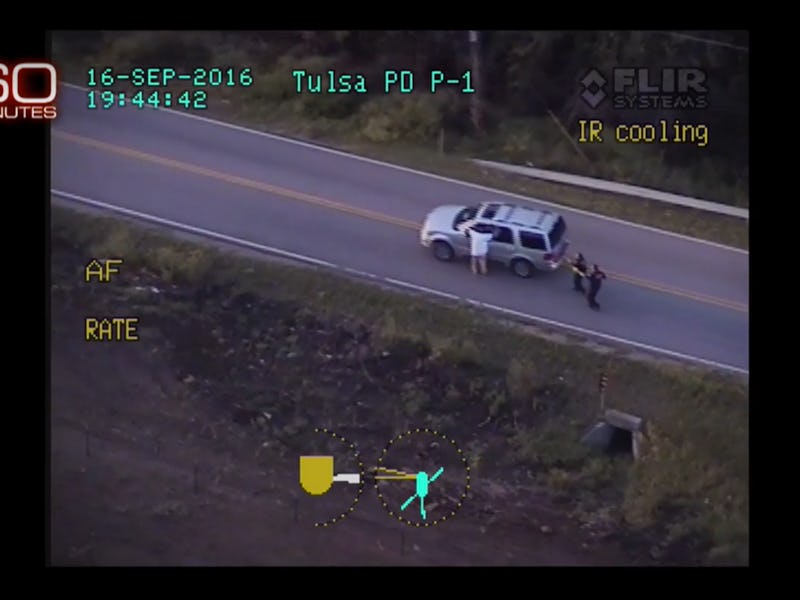Betty Shelby on Terence Crutcher Killing: "I am not racist."
The white police officer who killed an unarmed black man gives '60 Minutes' an interview.

Sunday on 60 Minutes, CBS correspondent Bill Whitaker interviewed Tulsa, Oklahoma police officer Betty Shelby about the tense moments leading up to the death of Terence Crutcher. She faces a charge of first-degree manslaughter for killing Crutcher on the evening of September 16, 2016.
On the day in question, Shelby and her partner Tyler Turnbough — both of whom are white — stopped Crutcher, a 40-year old black man, after receiving reports that he had parked his vehicle in the road and was acting strangely. In dashcam and helicopter video of the incident, Crutcher’s arms remain raised above his head for the majority of the confrontation. When he reached into the driver’s window of his SUV, Shelby loudly ordered him to stop. He didn’t respond to her command. Fearing that he was going for a weapon, she shot him. Crutcher died in the hospital later that day. Tulsa police found no weapon on Crutcher’s person or in his vehicle.
On 60 Minutes, Shelby maintains that she used appropriate force given the threat she perceived in the situation. She says that her actions were not influenced by race.
“My incident is not a racist incident. I am not racist,” she tells Whitaker. “What I based everything on was his actions, his behaviors. Race had nothing to do with my decision making.”
But research on the phenomenon known as implicit bias suggests that a person often can’t accurately evaluate whether race played a role in their decision-making. This is because implicit bias operates on a subconscious level, incorporating a lifetime of conditioning into split-second decisions.
“Implicit bias is the bias in judgment and/or behavior that results from subtle cognitive processes (e.g., implicit attitudes and implicit stereotypes) that often operate at a level below conscious awareness and without intentional control,” reads a report on the subject from the National Center for State Courts, a nonprofit court improvement organization.
Officer Betty Shelby reviews the footage of Terence Crutcher's death with CBS correspondent Bill Whitaker on '60 Minutes.'
A police officer in the line of duty faces tough decisions that can mean life or death for the people involved. Officer Shelby tells Whitaker that she saw Crutcher glance at her before reaching into his vehicle. She perceived this as his attempt to gauge her position so he could shoot her with the gun she thought he was reaching for.
“I’m feeling that his intent is to do me harm, and I keep thinking, ‘Don’t do this. Please don’t do this. Don’t make this happen,’” she tells Whitaker. And while her split-second decision may not have been explicitly based on the color of Crutcher’s skin, theories of implicit bias suggest that her unconscious conditioning made her believe he posed more of a threat to her safety than he actually did. Michael Smith and Geoffrey Alpert, researchers who study phenomena of bias in law enforcement, explain in a 2007 study how police officers can make unconscious negative assumptions about people of color.
“Stereotype formation and its consequences are largely unintentional and are driven by social conditioning and the illusory correlation phenomenon, which results in the overestimation of negative behaviors associated with minority group members,” write Smith and Alpert in their report, “Explaining Police Bias”.
Even though Shelby thought she was acting in accordance with proper use of force, the fact remains that Crutcher did not have a weapon and was not putting Shelby’s life in danger. Implicit bias theory could explain how Shelby may have seen Crutcher, a large black man, as a greater threat than he actually was, even though Shelby maintains that race played no role in her decision to pull the trigger.
Terence Crutcher’s twin sister, Tiffany Crutcher, thinks Shelby was in the wrong when the officer shot her brother. She says her brother clearly didn’t pose a threat, and suggests that Shelby’s claim of innocence may be disingenuous.
“Of course she’s saying everything she’s supposed to say to defend herself. What we saw on that video is what my dad always taught my brothers, taught us to do if we were pulled over by a police officer,” Tiffany Crutcher tells 60 Minutes. “‘Put your hands in the air and put your hands on the car.’ And my brother did what my father taught us.”
Shelby has pleaded not guilty to the charge of first-degree manslaughter. Her case is scheduled to go to jury trial on May 8. She maintains that Terence Crutcher’s actions caused his own death.
“He caused the situation to occur,” she tells Whitaker on 60 Minutes. “His actions dictated my actions.”